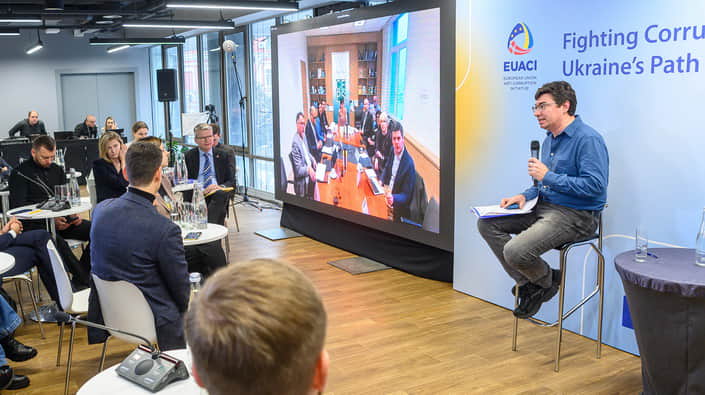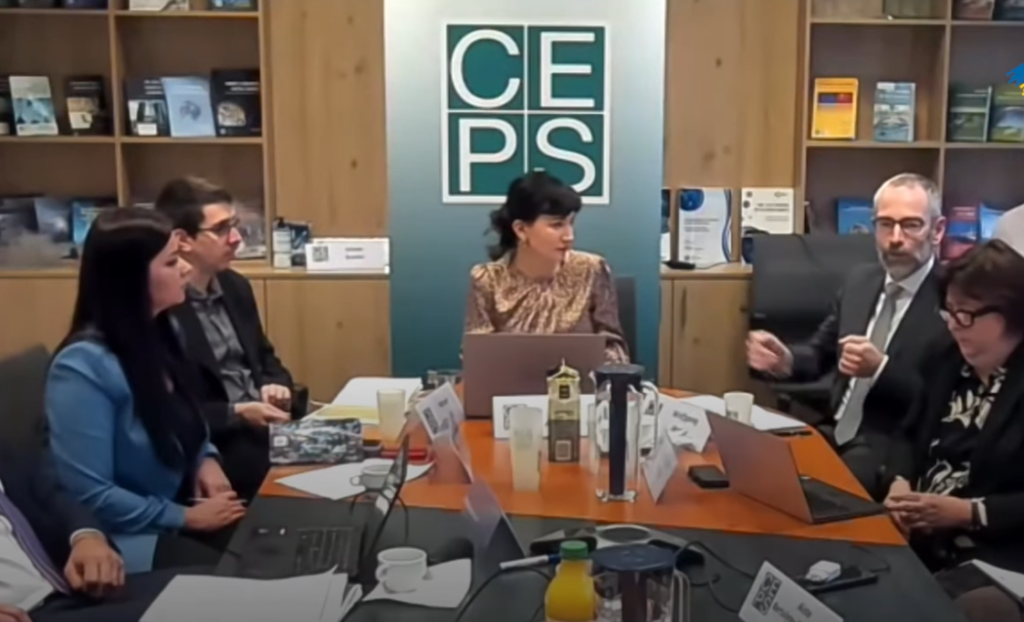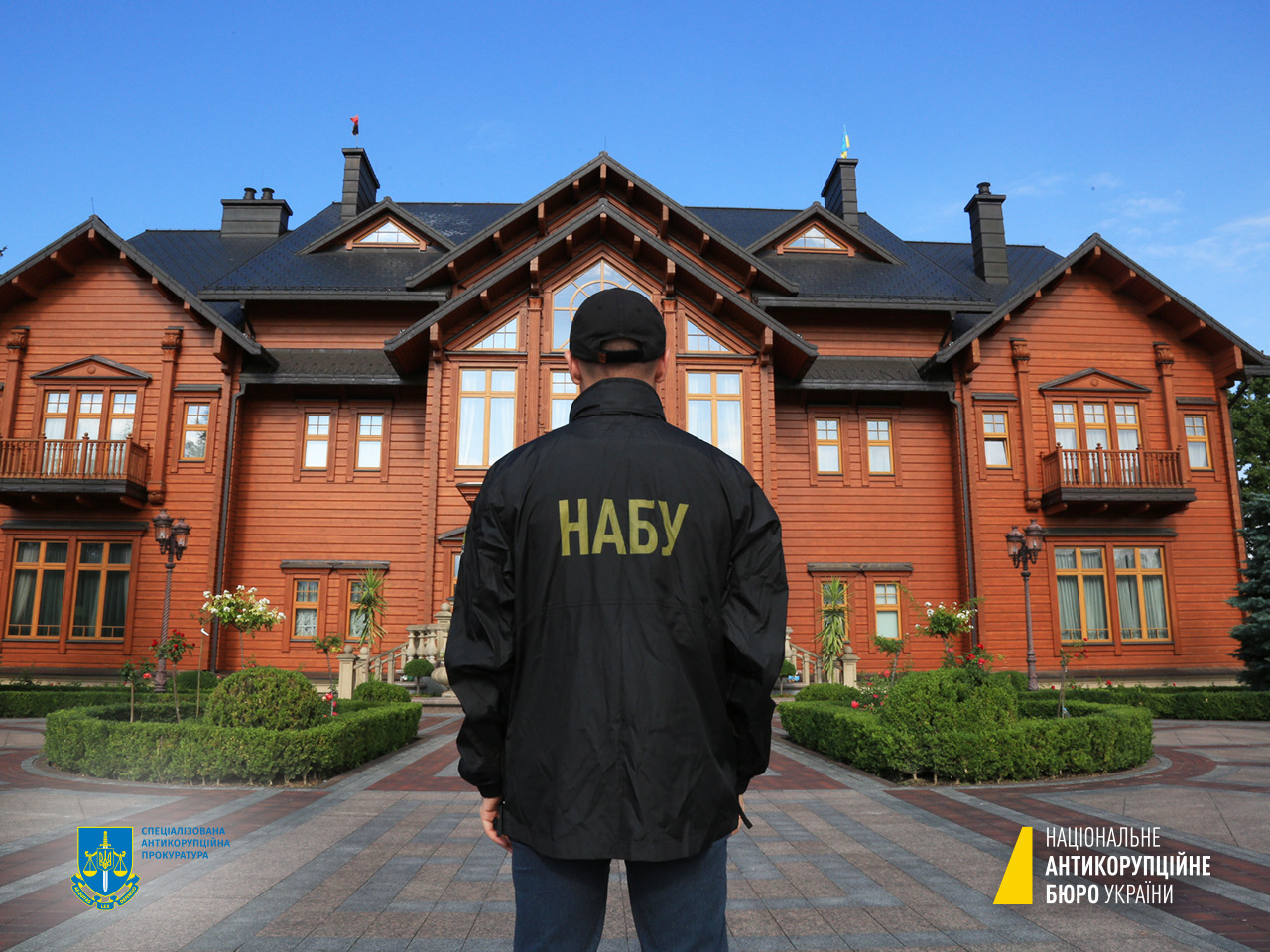Despite the common view that corruption is the primary problem in Ukraine, European anti-corruption experts argue that this issue is significantly overstated. The exaggerated perception of corruption in Ukraine is largely due to its constant emphasis in media and public discussions.
In comparison to European countries, where corruption might not be as prominently highlighted, the continuous spotlight on this issue in Ukraine disproportionately intensifies the public's perception of its severity.
This perspective was presented during the teleconference "Kyiv – Brussels," organized by the European Union Anti-Corruption Initiative (EUACI) in collaboration with the Ukrainian media outlet European Pravda and the Brussels-based center CEPS, focused on the theme "Fighting Corruption: Ukraine’s Path to the EU."
The roundtable included approximately 15 experts based in Brussels and Kyiv, comprising officials from the EU, national administrations of member states and Ukraine, representatives of international organizations, the private sector, civil society organizations, and experts from think tanks and academia.
Key topics discussed were Ukraine's readiness in terms of anti-corruption and rule-of-law for EU membership, the current state of fighting corruption within the EU, and the best practices of EU member states in addressing corruption.

According to the international corruption perception index from Transparency International, Ukraine is one of the most corrupt countries in the region. However, this indicator does not necessarily reflect the actual state of affairs.
"The corruption perception index does not necessarily provide an accurate picture of the level of corruption. Perception is also shaped by the influence of media and social networks. In Ukraine, where there are free and critical media, cases of corruption occupy a prominent place in the information space compared to many other countries. Perhaps that is why the measurement of perception creates the impression that the level of corruption is higher than it actually is," explains Allan Pagh Kristensen, head of the EU Anti-Corruption Initiative.
Sergiy Sydorenko, the editor of European Pravda, who moderated the video conference from Kyiv, notes that Ukraine's successes in combating corruption were widely acknowledged by the experts.
"Ukraine is already ahead of the EU in many respects," said Roland Papp, a Senior Policy Officer specializing in Illicit Financial Flows at Transparency International EU.
In particular, Ukraine has satisfied all seven of the anti-corruption prerequisites established by the European Union for starting accession negotiations.
This achievement is evidenced by the Verkhovna Rada passing the latest legislative requirements with a constitutional majority, followed by immediate presidential approval. The accomplishment is also recognized by Ukrainian anti-corruption activists, who are typically critical of the government's actions, Sydorenko notes.
Ukraine passes anti-corruption laws to advance EU integration
However, the perception of corruption among Ukrainians paints a significantly worse picture. Even those who have not encountered corruption in recent years may say in surveys that they definitely know about the 'total corruption' in Ukraine, says Sydorenko.
"We have a paradoxical situation," says Olena Halushka, a board member of Ukraine’s Anti-Corruption Action Centre. "When NABU (National Anti-Corruption Bureau of Ukraine) and SAP (Specialized Anti-Corruption Prosecutor's Office) show good results and detain someone, it is often perceived not as a positive sign – 'the anti-corruption infrastructure is working well,' but as a confirmation of worry – like, 'oh my God, look how much corruption there is in Ukraine, how can one work here?'"
The lack of trust among Ukrainians in state institutions can be traced back to the traumatic experiences under the totalitarian Soviet regime. In the Soviet Union, unlike democratic systems, state institutions didn't serve the interests of the citizens; therefore, for an average Soviet citizen, survival often entailed finding ways to circumvent the restrictive state policies. As a result, after 70 years of living under the totalitarian regime, the concept of the state as a beneficial entity is not fully ingrained, particularly among the older generations of Ukrainians.
The experts participating in the video conference agree that Ukraine has no other option but to continue fighting corruption until there is societal trust in the work of NABU and SAP as well as in the verdicts for corruption-related cases.

While arrests play a role in corruption prevention, the true key to effectively combating corruption lies in establishing a robust and efficient state system. Therefore, Ukraine should not focus to much on high-profile arrests. This view was expressed by Alina Mungiu-Pippidi, a Romanian and European expert in anti-corruption, known for her involvement in Romania's anti-corruption "miracle" that led to the arrest of top corrupt officials, including a prime minister.
Mungiu-Pippidi highlighted the challenges of building an anti-corruption system through verdicts. If the judicial system is part of the problem with corruption, it can't be part of the solution. She suggests a long-term commitment to judicial reform and using non-judicial (but legal) methods to combat corruption, like administrative measures, which might be more effective than lengthy criminal processes.
"Primarily use administrative, not criminal, levers. How many people have you seen lose their jobs due to suspicion of corruption? Dismissal is a simple step that doesn't require a lengthy criminal process," suggested Mungiu-Pippidi. "This can be more effective than finding someone who conducted corrupt procurement and then spending four, five or six years to put them behind bars."
Mungiu-Pippidi also criticizes the EU for measuring Ukraine's success by the number of anti-corruption verdicts against significant political figures, warning against the negative consequences of such an approach, like the practice of selective persecution.
"Instead of genuinely fighting the causes of corruption, such arrests help establish a practice of selective prosecution. Perhaps with the 'good guys' in power, you manage to arrest a prime minister – but then the people in power may change," she explained.
“Ukraine is doing everything to strengthen the fight against corruption,” EU official says
The criteria used to assess corruption, which focus on the perception of corruption rather than the actual state of corruption, have been criticized. Still, Transparency International does not intend to revise the methodology of their research. “The reality is that this is still the best indicator we have,” says Allan Pagh Kristensen.
"The Corruption Perceptions Index does not reflect reality – but it will be used, including by investors, because there is no alternative," agrees Zydrunas Bartkus, former head of the Lithuanian Special Investigation Service (analogous to NABU).
Altering the perception of corruption in Ukraine hinges on two pivotal factors:
- fostering a deeper trust in the state among Ukrainians;
- persistently carrying out anti-corruption measures.
Why Ukraine’s wartime anti-corruption quest gives ground for cautious optimism
"Sometimes it may seem to you that the course is shorter, that the finish is close, but no, it is 42 kilometers, and you have to think about the perspective... After all, in this marathon, you are now somewhere in the first 10 kilometers," says Asier Santillan Luzuriaga, diplomat of the EU Representation in Ukraine, head of the specialized department dealing with issues of the rule of law in Ukraine.
The good news is that Ukraine is moving fast.
"In a marathon, it is important not only how much time you have left, but also how fast you run. In recent months, Ukraine has been running quite fast. We can see this by the growing number of open criminal cases, by the growing number of sentences. Ukraine adopts important political and legislative decision," Kristensen points out.
Iryna Shyba, deputy head of EUACI believes that accession to the EU is definitely not the finish line of this "race". “After all, there is not a single country in the EU that has completely gotten rid of corruption," she adds.
Related:
- Poll: Corruption still major concern for Ukrainians despite war
- Ukraine's key anticorruption body finally gets a chief
- National Anti-Corruption Bureau, News from Ukraine
- Anti-Corruption Court, News from Ukraine
- How can Ukraine make anti-corruption institutions more
- Wartime anti-corruption quest in Ukraine
- Ukraine passes anti-corruption laws to advance EU

